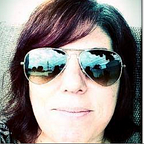empathy and ideology
It was 1970, maybe ’71. I was eight or nine. We were sitting in my mother’s 64 Impala convertible — roof down — in the parking lot of Modell’s Supermarket looking for my cousin Frances The crowd of teenagers gathered in the lot was thick, and they were setting off smoke bombs, making it hard to see. The cops had arrived and kids were scattering everywhere, running behind the building, running across the turnpike, all the while shouting anti-war slogans, yelling slurs at the cops, throwing bottles and cans and more smoke bombs.
My mother was terrified; scared for us, scared for cousin Frances, who was out there in that mess somewhere. I was thrilled. I had seen enough of the war on television, enough of Walter Cronkite to know the war was bad and all these teenagers and young adults running from the cops were only doing what they thought was right. I rooted for them then, for all of them to get away and not get caught, for their voices to be heard again and again. I wanted to be out there with them, throwing smoke bombs, chanting “make love not war” — which in my young mind meant only be nice to each other. I held up my hand in a peace sign as long-haired boys passed our car. I made myself part of it.
We never did find cousin Frances, but she made it home ok and the next day told me stories about all the protests she had been to, and why she risked everything to be there. I was radicalized at eight.
I listened to my 45 of Scott McKenzie’s “Are You Going to San Francisco” and dreamed of being a flower child, one of those hippies my father so often talked about in derisive tones. My parents are and always have been conservatives — that I eschewed their values and grew up to be way to the left of them always bewilders them, but I can trace it back to that night in Modell’s parking lot and cousin Frances. Later, I would attend no-nukes rallies and vote for third party candidates and rebel in all ways against the politics of my parents.
I think one of the key factors in leaning left is empathy. If you have enough empathy you’ll want people to have the basic necessities in life — food, shelter, a living wage — no matter who they are or where they come from. You want to preserve the dignity of others, even if it means you have to give of yourself for them to get it, whether that be with your time, your voice, your taxes. You want simple things like for people to live unafraid, unjudged. You detest billionaires and rail against the distribution of wealth. You just want everyone to be on equal footing. Empathy is not an ideology, but it’s a necessary component of having an ideology that comes with a doctrine of fairness.
I don’t talk to my parents about politics. It’s just easier that way. Occasionally, my father will bring up something he heard on Fox News and I’ll excuse myself from the room. I’ve long since stopped trying to talk to him about it, to reason with him. I don’t know what shaped his ideology, why he grew up a conservative, what happened in his life to make him become one of those people who says “make America great again” during an argument. I love my father; he’s kind, he’s generous, he gives back to his community and friends in so many ways that it flies in the face of his politics and I have such a hard time reconciling that altruistic person I know with the person who throws Sean Hannity talking points at me. He asks how he raised a socialist and I counter that while he was never shy about his politics and ideology, he never forced them on me, never expected me to pick up his mantle and carry on his beliefs. He shrugs. It’s a point of contention between us, but we rarely speak about it. He knows how I feel about the world at large, how I feel about safety net programs and cops and gun control.
I’m proud that I took everything I learned watching Walter Cronkite and pals on television during the Vietnam War, that I took all the lessons about feelings and empathy Mr. Rogers taught me, and gathered them into a lifelong set of beliefs that are at odds with those of my parents. With the exception of a short stint into madness, I’ve been true to my ideology since it started to take shape at eight years old in the Modell’s parking lot.
I think a lot about how I got here, and how fixed I am in my beliefs. I think back to those days of wanting to be a flower child, when my room was decorated in peace signs and I fancied myself a hippie-in-training, and how much of that is built on a foundation of empathy.
We just can’t expect people who support this administration to understand our views when the person they value the most is so lacking in empathy. I worry about this country, where we are and where we are headed. It’s a terrible time to be a person who cares.
